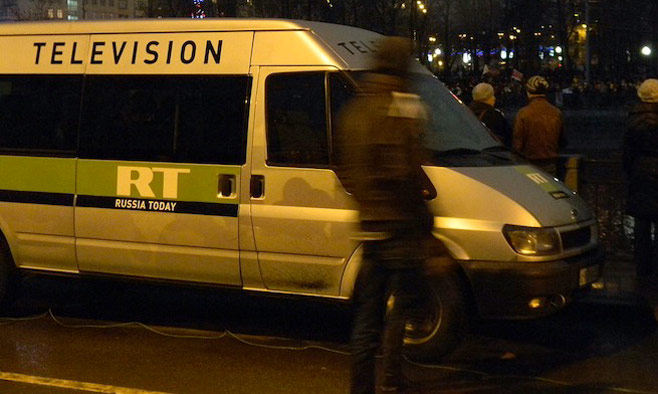
The popular U.S. publication The Daily Beast ran a major article in mid-September about RT, the Kremlin-sponsored television channel that broadcasts in foreign languages. It turns out that after 10 years of effort and an estimated $2 billion in government funding, the channel enjoys a far smaller audience than it claims.
Some might compare RT to the Winter Olympics in Sochi last year, categorizing both as propaganda stunts. However, I see a fundamental difference between the two.
Some question whether it was wise for Russia to spend so much money on the Olympics, but nobody can question that this country built a host of outstanding and beautiful sports facilities. (And similarly, I have no doubt that a number of Russian cities will receive beautiful and modern, albeit expensive, stadiums in preparation for the 2018 FIFA World Cup.)
However, RT is not an expensive television channel: It is an expensive project that only looks like a television channel. The Daily Beast writes that there is no serious evidence to suggest that anyone watches the channel — and, of course, with hundreds of television channels available in the world, it is not enough to simply be included on the list.
Even if RT does have an audience, the channel does not meet the basic criteria of a substantial media outlet. It never has exclusive reports concerning events in Russia, much less the world, and never provides a forum for commentators whose views serve as a basis for serious discussion.
By comparison, Al Jazeera — the media outlet that is managed and partly funded by the ruling dynasty of Qatar — has become an important source of news and commentary about what is happening in the Arab world.
This is primarily because it knows how to dig up important information that no other source can obtain and to host commentaries by people whose opinions enjoy an avid audience.
Anthropologists talk about “cargo cults” — primitive societies that witness how an airplane flies in desirable cargo, and then create wooden mock-ups of an airplane in hopes of eliciting the appearance of more goods.
The term has even found its way into the political discourse. Well, the RT channel is a cargo cult in its purest form.
But that is not all. When I mention this idea to my Russian colleagues, they object, saying that foreign channels such as BBC, Fox News and CNN are no different. They are all “cargo cults in reverse,” to borrow a term from my fellow columnist Ekaterina Schulmann, they argue, claiming that although Russia’s wooden plane does not bring down cargo out of the sky, neither do the others because no real planes exist. They are all wooden mock-ups.
Of course, having a “cargo cult in reverse” might make life easier for some. It is unnecessary to learn how to run a real television station when officials can simply tell the studio director what to produce and the end result looks real enough.
But the truth is that some television channels do find worthwhile stories, produce important news reports and provide serious commentary. There are, in fact, airplanes that really fly.
By Konstantin Sonin, The Moscow Times
Konstantin Sonin, a columnist for Vedomosti, is a professor at the University of Chicago Harris School of Public Policy Studies and the Higher School of Economics in Moscow.





